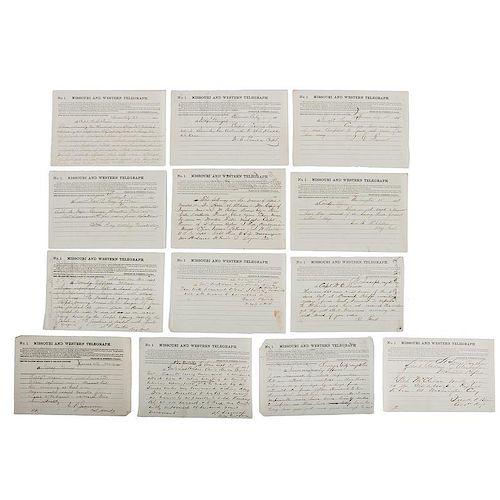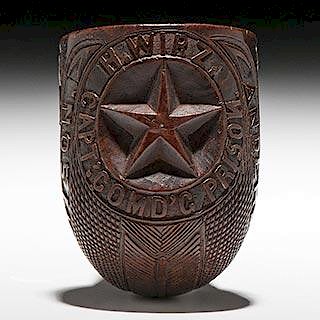Missouri and Western Telegraph Company Telegrams, Some Concerning Colonel Everett Peabody and a Traitorous Telephone Operator
About Seller
6270 Este Ave.
Cincinnati , OH 45232
United States
With offices in Cincinnati, Cleveland and Denver, Cowan’s holds over 40 auctions each year, with annual sales exceeding $16M. We reach buyers around the globe, and take pride in our reputation for integrity, customer service and great results. A full-service house, Cowan’s Auctions specializes in Am...Read more
Two ways to bid:
- Leave a max absentee bid and the platform will bid on your behalf up to your maximum bid during the live auction.
- Bid live during the auction and your bids will be submitted real-time to the auctioneer.
Bid Increments
| Price | Bid Increment |
|---|---|
| $0 | $25 |
| $500 | $50 |
| $1,000 | $100 |
| $2,000 | $250 |
| $5,000 | $500 |
| $10,000 | $1,000 |
| $20,000 | $2,500 |
| $50,000 | $5,000 |
| $100,000 | $10,000 |
About Auction
Feb 21, 2017 - Feb 22, 2017
Cowan's Auctions dawnie@cowans.com
- Lot Description
Lot of approx. 268 telegrams from the Missouri and Western Telegraph Company, mostly addressed to Major William E. Prince, 3rd US Army Infantry, from 1861 through March 1862, with 14 that concern a possibly traitorous telegraph operator feeding valuable information to an ardent secessionist. Individuals of note who sent telegraphs to Prince include: General George McClellan; General Lucius Fairchild; Major General John C. Fremont; Major General Samuel Ryan Curtis; Edward D. Townsend; Colonel Everett Peabody; Captain G.C Bingham; Major Van Horn; Lieutenant Colonel P.R. Anthony; Brigadier General Samuel D. Sturgis; Indian Agent W.W. Dennison; and General Henry W. Halleck. Also included in the lot is an oath of service by a telegram operator named McDill and a letter of recommendation written by the Governor of Massachusetts to the Secretary of War on behalf of Prince dated December 13, 1862.
Prior to the Civil War, Major William E. Prince already had an impressive military career serving in the Mexican American War and in the Northwestern Territory. After the Battle of Santa Cruz, he was brevetted a captain for his gallant and meritorious service. When the Civil War began, the army stationed him in Kansas as captain of the 3rd Infantry of the US Army. Months before the Battle of Lexington in Kansas, Prince received several reports on the position of the Confederate Army. On August 30, 1861, from Kansas City, MO, Colonel Everett Peabody of the 25th Missouri Infantry telegraphed Prince:
A dispatch from Lt. Joseph this morning says one hundred and fifty Rebel cavalry are parading the streets of St. Joseph with fifteen hundred more a short distance off.
The next day, Peabody sent Prince another update:
There is but one Secession Camp numbers variously estimated at from three to six hundred the rest have either gone towards Lexington or South the camp is at twenty miles marching distance the line is cut between St. Joseph and St. Louis and we can get no advice from Genl Pope If I understand your position I must look to you for protection (Kansas City, August 31, 1861).
Scandal struck the regiments when Major Thatcher accused a telegram operator, E.B. McDill, of an alleged breach of confidence (Williams to Prince, Leavenworth, KS, September 2, 1861). [Thatcher] says a prominent secessionist [is] in this place [and] has a verbatim copy of the message spoken of but refused to tell persons name or show copy, wrote Peabody (Peabody to Prince, Kansas City, September 2, 1861). Prince had a copy of McDill’s oath on file where he denounced the Confederacy and promised not to aid them in any way. Peabody arrested McDill for the charges. McDill demanded his release on the reverse of one of Peabody’s telegraphs and informed Prince that another officer had been opening his dispatches for Peabody. Outraged, Prince telegraphed Peabody and asked if he shared their messages with others. Peabody responded:
Of course no one has opened your dispatches except myself The reason why I was determined to change the telg arrangement was that a dispatch I sent to you this morning of which nobody could have known, since I told no one except my Major, was known all over town at once (Kansas, September 2, 1861).
His answer and arrest were not enough for Captain Prince. McDill was released that evening and sent a message to Prince:
My arrest was doubtless malicious as you will see by Col Peabody’s messages. I am satisfied Maj Thacher did the revealing…It has hurt my standing in this office and hurt the business of the office also (Kansas City, September 3, 1861).
Prince continued to receive messages from Peabody and other officers about Confederate forces throughout the day with conflicting accounts. Peabody informed Prince, I have been compelled to place pickets in every direction in consequence, as I believe the operator having revealed my dispatch to you this morning—send another agent here (Kansas, September 2, 1861). R.C. Clowry involved himself and telegraphed Prince on behalf of McDill, If he was not a Union man he could not stay on the line, wrote Clowry, I believe the charge false Col Peabody has given us much trouble and is very insolent we are accountable to Genl Fremont who has full confidence in us (Omaha, September 2, 1861). The brash action without sufficient grounds was not the first, nor would it be the last, perpetrated by Peabody.
Prior to the Battle of Shiloh Peabody acted against orders, and organized a search party to test a position he felt was vulnerable. His unauthorized actions exposed rebel troops that allowed General Sherman and General Prentiss a few precious hours to respond against what would have been a surprise attack. Despite the warning, General Prentiss blamed Peabody for starting the Battle of Shiloh. Although Peabody’s insubordination possibly saved many lives, General Prentiss never acknowledged Peabody’s role in alarming him of the attack. Peabody was wounded four times in the battle. The final wound was a fatal shot to the head. After the fight, his men recovered his body and buried him inside an ammo box. On a crude wood plank above his grave, they engraved, “A braver man ne’er died upon the field; A warmer heart never to death did yield” (Harvard Memorial Biography, Colonel Everett Peabody).
After the affair was resolved, Prince continued to command his regiment. He was promoted to major November 23, 1861, and was brevetted lieutenant colonel by the end of the war. His telegraphs between 1861-1862 came from soldiers, generals, and other officials ordering him to move troops, informing him of captured prisoners, and more. A small sampling of additional telegraphs of note include:
Colonel C.R. Jennison's telegraph from Pleasant Hill, MO, which reads, Captured 22 wagons supposed to be burned at this place also two hundred oxen--twelve hundred Rebels within three miles will attack them tonight.
M.P. Berry to Prince from Kansas City reads:
Colum advancing ten thousand 10,000 strong McCulloch advancing on Jefferson City rapidly force at Lexington capitulated on Friday…Loss on our side fourth (40) killed and one hundred and eleven (111) wounded—Terms of surrender whole command retain private property, officers their side arms…Col Peabody wounded in ancle[sic] by grape(?)—Col Day in body Maj Van Horn in thigh thirty six (36) hours without water….Enemies force at Lexington thirty to thirty five thousand (35,000) men many of them one day volunteers (1861).
Henry W. Depuy, agent for Pawnee Indians, Omaha, to Prince on August 5, 1861, states:
I understand from agent of Otoe Indians that traitors have furnished arms to Indians near Marshall County—All is yet quiet there, but forces should be sent in that direction in anticipation of trouble.
F.J. Van Horn to commanding officers, sent from Kansas City on August 21, 1861, notes:
I am convinced by reliable information that an attack is meditated on this post within a very few days by a large force estimated at from fifteen hundred to two thousand I must have reinforcements at once responcible[sic] men have come twenty miles to inform me three have been here today can you not send force enough to cut them off before they reach the city send all you can and above all artillery they have three pieces can you send by boat tomorrow.
J.C. Fremont writes to General James H. Lane(?) from St. Louis on September 23, 1861:
Lexington two having surrendered a combined attack upon us Rebels infesting the country between Springfield and Lexington will be made by US troops under my command without delay You are directed to watch the enemy as narrowly as possible to hold Kansas City at all hazards and to keep me constantly informed of his and your movements.
To the Commanding Officer F. Leavenworth from Brigadier General S.R. Curtis on November 15, 1861:
I am informed that a band of rebels at Napoleon who have and will attack our boat the sunshine is going up and the Rupel coming down be in danger—If force can be had at your place or Kansas it would be well to use it as an escort coming down by the Rupel and going back by the sunshine is loaded with Govt. wagons.
Provenance: N. Flayderman and Co., Inc.All are in good condition with some minor toning, very few have colored pencil notations.Condition
- Shipping Info
-
SHIPPING. At the request of the buyer, Cowan's will authorize the shipment of purchased items. Shipments usually occur within two weeks after payment has been received. Shipment is generally made via UPS Ground service. Unless buyer gives special instructions, the shipping method shall be at the sole discretion of Cowan's Auctions, Inc.. Cowan's is in no way responsible for the acts or omissions of independent handlers, packers or shippers of purchased items or for any loss, damage or delay from the packing or shipping of any property.
-
- Buyer's Premium



 EUR
EUR CAD
CAD AUD
AUD GBP
GBP MXN
MXN HKD
HKD CNY
CNY MYR
MYR SEK
SEK SGD
SGD CHF
CHF THB
THB












